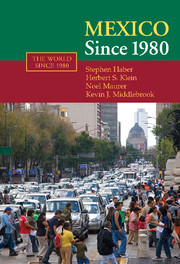Book contents
- Frontmatter
- Contents
- List of Figures
- Acknowledgments
- Abbreviations and Acronyms
- 1 The Second Mexican Revolution: Economic, Political, and Social Change Since 1980
- 2 Mexico Before 1982: The Political Economy of Authoritarian Rule
- 3 The Causes and Consequences of Free Trade
- 4 The Mexican Banking System: The Politics and Economics of Financial Underdevelopment
- 5 The Transformation of Mexican Politics
- 6 Health, Education, and Welfare in Mexico Since 1980
- 7 Democracy and Development in Mexico: Future Challenges and the Legacies of Authoritarian Rule
- Bibliography
- Index
6 - Health, Education, and Welfare in Mexico Since 1980
Published online by Cambridge University Press: 05 September 2012
- Frontmatter
- Contents
- List of Figures
- Acknowledgments
- Abbreviations and Acronyms
- 1 The Second Mexican Revolution: Economic, Political, and Social Change Since 1980
- 2 Mexico Before 1982: The Political Economy of Authoritarian Rule
- 3 The Causes and Consequences of Free Trade
- 4 The Mexican Banking System: The Politics and Economics of Financial Underdevelopment
- 5 The Transformation of Mexican Politics
- 6 Health, Education, and Welfare in Mexico Since 1980
- 7 Democracy and Development in Mexico: Future Challenges and the Legacies of Authoritarian Rule
- Bibliography
- Index
Summary
Mexico has experienced significant changes in social welfare policy since the early 1990s. The administrations of Ernesto Zedillo Ponce de León (1994–2000) and Vicente Fox Quesada (2000–2006) redesigned programs providing basic health care, housing, education, and retirement pensions in order to broaden access to these services. In some instances (particularly the partial privatization of health care and the creation of privately managed retirement pensions), meeting the goal of expanded program access in the context of continuing revenue shortages required the government to shift part of the responsibility for welfare provision from the public sector to individuals and families. The Zedillo and Fox administrations also adopted more selectively targeted programs aimed at reducing poverty in Mexico.
One key element underpinning these changes was a marked shift in the political logic shaping welfare policy making. In the social welfare model that developed during the period of Institutional Revolutionary Party (PRI) hegemony from the late 1930s through the 1980s, select constituencies gained access to public services as a form of patronage. Indeed, there was a wide gap between an official rhetoric proclaiming the federal government's constitutionally mandated responsibility to cover the basic welfare needs of all Mexican citizens, and actual policy practice. Programs such as President Carlos Salinas de Gortari's (1988–1994) main poverty-alleviation initiative, the National Solidarity Program (PRONASOL), were notably politicized.
- Type
- Chapter
- Information
- Mexico since 1980 , pp. 161 - 200Publisher: Cambridge University PressPrint publication year: 2008



